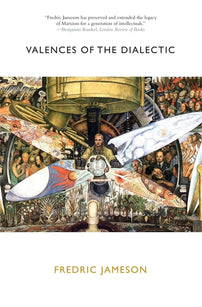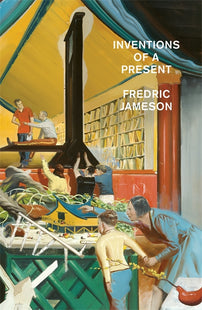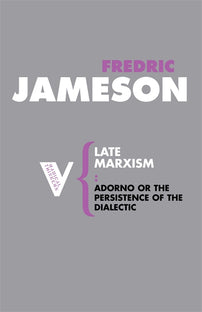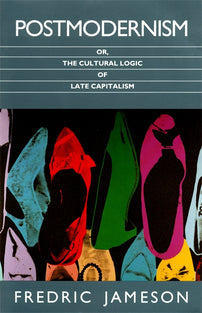Jameson’s complex chord
Sianne Ngai likens the totality of Fredric Jameson's work to a musical composition, hitting key notes that synthesize in the composer's master chord. The work that most embodies this phenomenon, she argues, is Jameson's Valences of Dialectic.

Socrates: Well, Phaedrus, I am myself a lover of these divisions and collections, so that I may be able to think and to speak; and if I believe that someone else is capable of discerning a single thing that is also by nature capable of encompassing many, I follow "straight behind [him]." God knows whether this is the right name for those who can do this correctly or not, but so far I have always called them "dialecticians."
Some composers start the organization of a work with a massive, complex chord—which is to say, with everything that will happen already there at once. This is how we might understand the thought of Fredric Jameson. From text to text, the chord undergoes modulations in which, over almost a half-century of writing, certain notes and/or combinations of notes come to be more insistent than others. It is fascinating to track this.
First published in 2009 at a hefty 625 pages, Valences of Dialectic resembles other middle-period volumes by Jameson in that relatively unusual weight class, such as The Modernist Papers and The Ideologies of Theory, in gathering, sorting, and re-presenting essays initially appearing over decades in disparate contexts and journals. Such retrospective acts of retotalization are not superficial; creating “divisions and collections” is, after all, how Socrates defines the work of “dialecticians” in Phaedrus. What the act of retotalization in Valences freshly forefronts is also “dialectic,” confirming one’s hunch that, insofar as there is a complex master chord in Jameson, arguably already hearable in the first book on Sartre, if most discernible in The Political Unconscious, that “dialectic” is one of its notes increasingly pronounced over time.
[book-strip index="1"]
This hunch gets further borne out by the surprising, if also half-buried, revelation in Valences, at the end of a footnote at the end of the first chapter, “Three Names of the Dialectic,” that its dialectical project is even more ambitious than it first appears, pointing beyond the book at hand. Jameson writes: “Valences is something of a Hamlet without the prince, insofar as it lacks the central chapter on Marx and his dialectic which was to have been expected. Two complementary volumes, commentaries of Hegel’s Phenomenology and Marx’s Capital (volume 1), respectively, will therefore complete the project.” The Hegel Variations and Representing Capital, as it turns out, complete a trilogy of which Valences is the semi-secret overture.
This overture in turn has five parts. There are two opening sections explicitly on theme: the first on the dialectic’s various “names” (“The Dialectic”; “Many Dialectics”; and the interestingly performative utterance, “It’s Dialectical!”), and the second on “Hegel Without Aufhebung.” Three more sections follow: “Commentaries,” which continues the previous section’s project of re-examining Deleuze, Derrida, and other non- or anti-dialectical philosophers through the lens of the dialectic; “Entries,” which offers a satisfyingly pedagogical, scale-like run through Marxism’s best-known topics and keywords (“commodification,” “contradiction,” “ideology,” “globalization,” “utopia,” “actually existing Marxism” and “cultural revolution”); and finally, “The Valences of History,” an almost book-length essay on Paul Ricoeur’s Time and Narrative, once again supplemented, as in the readings of Deleuze and Derrida, by the “dialectical and Marxian categories missing from it, from which History today can scarcely be experienced” (fn 68, 70). Non- and even anti-dialectical thinkers are thus revealed throughout Valences as far more indebted to dialectical thinking than they would admit or at first appear, if often in an “unsublated” or prematurely abandoned version of this negation-driven mode of explanation. Here, the thinker becomes transfixed by an impasse or antinomy marked by binary opposition (e.g., “undecidability”), rather than recognizing that very impasse as the threshold of contradiction, which is already implicitly positioning one “inside” or at the fulcrum of a conceptual gearshift or transition.
[book-strip index="2"]
Banding together for monthly meetings over the last year and a half, Jonathan Flatley, Colleen Lye, Chris Nealon and I just recently finished (re)reading Hegel’s The Science of Logic. A fun fact I mention only because, in my own case, the impetus to tackle that formidable, and as Jameson points out, peculiarly non-argumentative philosophical work, came after reading Jameson’s own chapter in Valences on the Logic six years ago, while still working on Theory of Gimmick. That chapter, “Hegel and Reification,” which kicks off the second section titled “Hegel Without Aufhebung,” focuses on the misadventures of Verstand (Understanding) across the Encyclopaedia Logic. And it directly inspired the project I am working on right now: a book called Inhabiting Error: The Affective Dimensions of Dialectical Thinking, of which the opening essay is titled “Ugly Thinking.” (I might call the entire book Ugly Thinking; I haven’t fully decided yet).
In any case, this is the first of the three passages from “Hegel and Reification” that jumped out at me:
Verstand, although omnipresent, and the very thinking of daily life itself, is the villain of the piece. We cannot say that throughout the Logic, Hegel tracks down the truth like a detective, but we can certainly say that he tracks error, and that error always and everywhere takes the form of Verstand. […] Unlike the Faerie Queene, however, if there is a villain, there are no heroes: none of the knights, not the Dialectic, not Reason (Vernunft), not Truth, nor Speculative Thinking, nor even the Notion itself, goes forth to do battle with this baleful force (although it might perhaps be argued that Philosophy is itself such a heroic contender, a word which, besides meaning Hegel, also means all those other positive things just mentioned). And this may have something to do with the fact that Verstand also has its place, as we have suggested, and cannot only not be done away with for good: it would be undesirable to do so, it is the taming and proper use of this mode rather than its eradication, which is wanted. (Valences, 82)
Here is the second:
[The] Logic is no traditional piece of philosophical discourse: it does not, turgidly and laboriously, attempt to expound some idea which the reader then attempts, by retracing the steps of the argument, to recreate and thus to grasp or “understand.” Or rather, this does seem to happen at specific moments, and we certainly still do struggle to understand what Hegel meant by this or that: but the act of reading the Logic is a great deal more complicated than that, and requires, as with a complicated novel, that we dispose of larger units of memory in which to organize the individual episodes. Better still the Logic is like a piece of music, and its text a score, which we must ourselves mentally perform (and even orchestrate). […] In any case, the aesthetic set towards the text moves it away from philosophizing and argument, let alone truth, and thereby risks depriving it of its most fundamental driving impulse and passion, indeed, its very justification. (Valences, 81, my italics)
And here is the third:
[Most] philosophical discourse claims a certain conceptual success it hopes to record successfully, and even to convey. Hegel’s moments are by definition moments of failure: the failure to think, to win through to the concept, to achieve even a limited but complete act of intellection. The task of his writing will therefore be paradoxically self-defeating: to demonstrate (successfully) how completely we must necessarily fail to think this or that category. But in order for it to be meaningful, the failure must be a very basic and fundamental one, it must come as the result of loyally attempting to think, and at the end of a strenuous and absolute assault on the category in question. And it is to be sure a frustrating matter: who can find it in them to commit to a cause lost in advance, an experiment conducted with a view to proving itself impossible? What saves the matter, no doubt, is the simple fact that, however much they may be intellectual or conceptual failures, the categories are the stuff of daily life and daily speech, rehearsed over and over again, and quite impossible to replace with anything better, purer, more Utopian: nor does Hegel try to do so, even though he does seem to posit “philosophizing” as some activity not altogether accessible to the masses. (Valences, 81, my italics)
Piggybacking on these specific points about Hegel’s Logic, the two things I am now trying to twist together in my work on the affective/aesthetic dimension of what Marcuse calls “negative thinking” are the following:
- The idea of the dialectical text as a text we inhabit, and perform, like a musician plays a score, or an actor, a script,
- …. even while it is an explanatory text propelled in its successive retotalizations of its own conceptual material by non-truth or error (and by the recursive negation of that negativity in turn).
Jameson’s writing has always been an inspiration. But I have never been as directly catapulted into new writing as I have by Valences of the Dialectic, which, in suddenly insisting on one note or dissonant interval in particular, made me aware for the first time of the differentiated unity of the bigger chord.
See all works by Fredric Jameson here. His new book, Inventions of a Present: The Novel in its Crisis of Globalization is out on May 7.
[book-strip index="3"]





